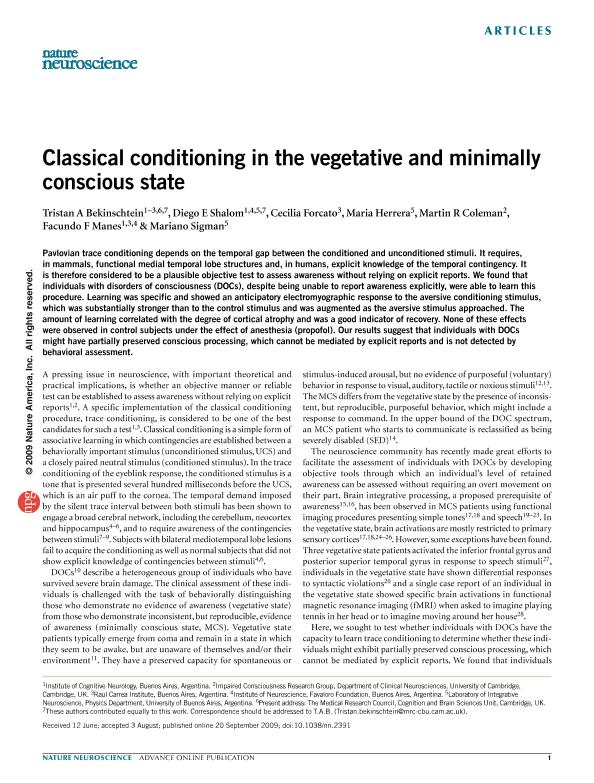Artículo
Classical conditioning in the vegetative and minimally conscious state
Bekinschtein, Tristán Andrés ; Shalóm, Diego Edgar
; Shalóm, Diego Edgar ; Forcato, Cecilia
; Forcato, Cecilia ; Herrera, Maria Silvia
; Herrera, Maria Silvia ; Coleman, Martin R.; Manes, Facundo Francisco
; Coleman, Martin R.; Manes, Facundo Francisco ; Sigman, Mariano
; Sigman, Mariano
 ; Shalóm, Diego Edgar
; Shalóm, Diego Edgar ; Forcato, Cecilia
; Forcato, Cecilia ; Herrera, Maria Silvia
; Herrera, Maria Silvia ; Coleman, Martin R.; Manes, Facundo Francisco
; Coleman, Martin R.; Manes, Facundo Francisco ; Sigman, Mariano
; Sigman, Mariano
Fecha de publicación:
10/2009
Editorial:
Nature Publishing Group
Revista:
Nature Neuroscience.
ISSN:
1097-6256
Idioma:
Inglés
Tipo de recurso:
Artículo publicado
Clasificación temática:
Resumen
Pavlovian trace conditioning depends on the temporal gap between the conditioned and unconditioned stimuli. It requires, in mammals, functional medial temporal lobe structures and, in humans, explicit knowledge of the temporal contingency. It is therefore considered to be a plausible objective test to assess awareness without relying on explicit reports. We found that individuals with disorders of consciousness (DOCs), despite being unable to report awareness explicitly, were able to learn this procedure. Learning was specific and showed an anticipatory electromyographic response to the aversive conditioning stimulus, which was substantially stronger than to the control stimulus and was augmented as the aversive stimulus approached. The amount of learning correlated with the degree of cortical atrophy and was a good indicator of recovery. None of these effects were observed in control subjects under the effect of anesthesia (propofol). Our results suggest that individuals with DOCs might have partially preserved conscious processing, which cannot be mediated by explicit reports and is not detected by behavioral assessment.
Palabras clave:
Disorders of Consciousness
,
Preserved Conscious Processing
Archivos asociados
Licencia
Identificadores
Colecciones
Articulos(IFIBA)
Articulos de INST.DE FISICA DE BUENOS AIRES
Articulos de INST.DE FISICA DE BUENOS AIRES
Articulos(IFIBYNE)
Articulos de INST.DE FISIOL., BIOL.MOLECULAR Y NEUROCIENCIAS
Articulos de INST.DE FISIOL., BIOL.MOLECULAR Y NEUROCIENCIAS
Citación
Bekinschtein, Tristán Andrés; Shalóm, Diego Edgar; Forcato, Cecilia; Herrera, Maria Silvia; Coleman, Martin R.; et al.; Classical conditioning in the vegetative and minimally conscious state; Nature Publishing Group; Nature Neuroscience.; 12; 10; 10-2009; 1343-1349
Compartir
Altmétricas



